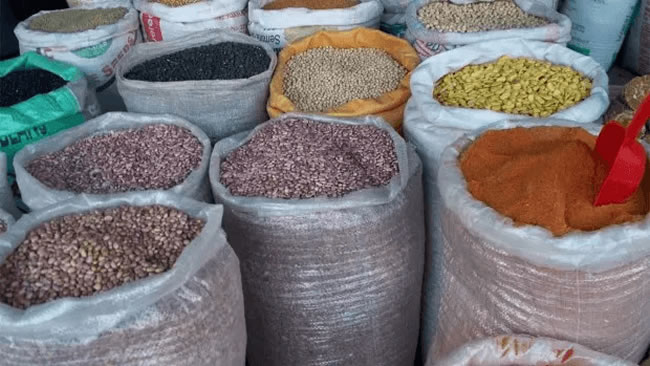


Nigeria’s quest to achieve food security may turn out to be a mirage if it does not strengthen its strategic food reserve and equip silos in order to reduce post-harvest losses which have been the one of the major challenges of the agricultural sector
The Food and Strategic Reserve Department (FSRD) is a Department in Federal Ministry of Agriculture and Rural Development, Abuja (FMARD). The department operates through five distinct established divisions to carry out its mandate, namely: Price Stabilization, Strategic Reserve, Emergency Food Supply and Logistics, Nutrition and Food Access, School Feeding Program.
This department, which is under the supervision of the Minister of Agriculture and Rural Development, takes orders to release food directly to the president of the country.

FSRD is the apex of the three tiers of Storage Programme of the Federal Government launched in 1987, whereby the department is expected to hold five percent of the annual food production in the country as Strategic Food Reserve stock, the state governments expected to hold 10% as buffer stock, and the private sector/farmers to hold 85% as on-farm/domestic storage component.
The primary objectives of establishing the department are to keep the National Strategic Food Reserve Stock, provide first line of food relief in times of emergencies to enhance food security. Others are to stabilize prices of food commodities, encourage food production and reduce postharvest losses through its numerous programmes.
The department through its crop of engineers has supervised the construction of different designs, types and capacities of storage facilities in use by the department over the years (48 unit warehouses and 33 units silo complexes when fully completed).

It has equally carried out periodic rehabilitation of the facilities as the need arises, to ensure optimum operational efficiency. The technical team trained by the department also undertakes routine and preventive maintenance of the entire storage facilities, including the material handling equipment and other ancillary machines/components also as the need arises, to enhance effective and efficient use. This has contributed immensely in the reduction of production down-time to ensure timely delivery of operations in the storage facilities.
One of the department’s major responsibilities is to procure food commodities according to dictates of public procurement, keep and manage the National Food Reserves stock.
Most times the FSRD collaborates with international organisations/NGOs such as WFP, ECOWAS, for foreign interventions, as well as National Emergency Management Agency (NEMA) which has the statutory responsibility of distributions of the food commodities to the vulnerable, especially for local interventions.
Due to lean budgetary allocation of the FSRD in the subsequent years, the capacity utilization of the silo complexes by the government reduced tremendously, due to enormous funds needed for stocking and attendant overhead cost.
Conservatively it would cost the Government N93billion to stock the 33 silo complexes. This can hardly be attained in view of financial requirement which far exceeds the annual budget of the ministry.
Consequently, in August 2013, the FMARD initiated a transaction process to concession the operations of some silo complexes to the private sector. The transaction process was driven by an appointed international transaction adviser Messrs Lion Head Global Partners, in partnership with CPCS Transcom Benchmac and Inc., with the help of World Bank and followed the guidelines stipulated in the National Public and Private Partnership (“PPP”) Policy and the Infrastructure Concession Regulatory Commission (ICRC) Act (2005).
After an extensive transaction/negotiation process and approval of the Federal Executive Council (FEC), Seventeen (17) out of the 33 silo complexes were awarded and handed over to Five companies on the 28th September 2020 for a Concession term of ten years.
The government decided to manage Six of the silo complexes for strategic food reserve stock and price stabilization activities, while the remaining silos were also approved by FEC for concession in the second phase.
The entire concession programme is targeted at increasing the capacity utilisation of the silo complexes, creation of wealth and jobs for the citizenry, increasing farmer’s income through increase private sector production, generating revenue for the Federal Government.
The department of FSRD in a bid to take food storage spaces to the grassroots, private sector and the local farmers under the warehouse leasing programme, has also leased some of its warehouses to encourage increase in food production.
Some of the beneficiaries are AFEX exchange holdings, Nigeria commodity Exchange (NCX), and individual farmers. Through the lease project, huge revenue has been generated for the government over the years.
The department is almost through with the framework for commencement of Warehouse Receipt System (WRS) whereby farmers will have the opportunity to bring their harvested products for safe storage, and can take credit facilities pending the sales when prices must have appreciated.
Also in a bid to ensure value addition and help grain off -takers such as agro-processors and millers get raw materials in bulk and eliminate challenge of transporting of huge quantities of grains by farmers, the department established grain aggregation centres through PPP arrangement.
About 25 units of grain aggregation centres were established in major grain producing areas of the country. Each centre was equipped with grain dryers, industrial grain cleaners, magnetic separators, moisture testers and weighing scale.
Since its establishment, it has added value to grain economy in the various areas, and since being handed over to the private sector, especially Paddy Rice Association of Nigeria (PRIDAN) members.
Following the treaty signed by ECOWAS Heads of Government for the establishment of a Regional Food Reserve in 2014, the department went into collaboration with ECOWAS for the keeping and management of its regional food reserve stock, using FSRD grain depot in Hotoro, Kano State. Since inception of this collaboration, the department has performed excellently and using its wealth of experience in food safety, handling and storage to the benefit of the regional body.
Since inception oF FSRD, it has lived up to its billing, especially now considering the increasing number of emergencies and vulnerable populations in Nigeria. Having emerged as one of the most important tools of government as far as food security is concerned, and having successfully collaborated with the World Food Program (WFP) and USAID in the giving of food aids to neighbouring countries of Niger and Chad respectively in the past shows that the department has capacity as well as operates using global best practices.
Further being entrusted with the Regional Food Reserve of ECOWAS simply demonstrates uncommon trust, transparency, competence and capabilities of the Food and Strategic Reserve Department of Federal Ministry of Agriculture and Rural Development.
If substantial increase in budgetary allocations is achieved, the department has the potential to achieve even more in minimizing the protracted issue of post-harvest losses and food insecurity bedevilling agricultural development in Nigeria.
YOU SHOULD NOT MISS THESE HEADLINES FROM NIGERIAN TRIBUNE
PICTORIAL EXPLAINER: How To Identify Fake New Naira Notes
The Central Bank of Nigeria (CBN) has released security features to help identify fake new naira notes. According to CBN’s template, the Security features to look out for are the following…
Ondo Councils’ Workers Shut Down Assembly Over LG Autonomy
LOCAL government workers under the aegis of Nigeria Union of Local Government Employees (NULGE), Ondo, on Tuesday, stormed the State House of Assembly, threatening a showdown with the lawmakers over the signing of local government autonomy…
FG To Discontinue Cash Withdrawal From Public Accounts
The Federal Government is putting the final touches to all necessary measures to stop cash withdrawal from federal, state, and local government accounts. The Director/Chief Executive Officer of the Nigerian Financial Intelligence Unit (NFIU), Modibbo Hamman Tukur, revealed…
Reps Probe Crude Oil Sales Over $2.4bn Revenue Loss
The House of Representatives on Tuesday unveiled plans to investigate the allegation bothering on the alleged loss of over $2.4 billion in revenue accruing from the illegal sale of 48 million barrels of crude oil export from 2014 to date…
Emefiele/DSS Tango: Falana Asks Judiciary To Treat Civil Liberty Cases Equally
LEADING rights lawyer, Mr. Femi Falana, on Tuesday addressed the controversial move by the nation’s secret police to arrest and detain the embattled Governor of the Central Bank of Nigeria (CBN), Godwin Emefiele…
EDITORIAL: CBN’s New Cash Withdrawal Limits
As a follow-up to its redesign of the N200, N500, and N1000 banknotes, the Central Bank of Nigeria (CBN) recently announced a new policy that mandates deposit money banks and other financial institutions to ensure that…








